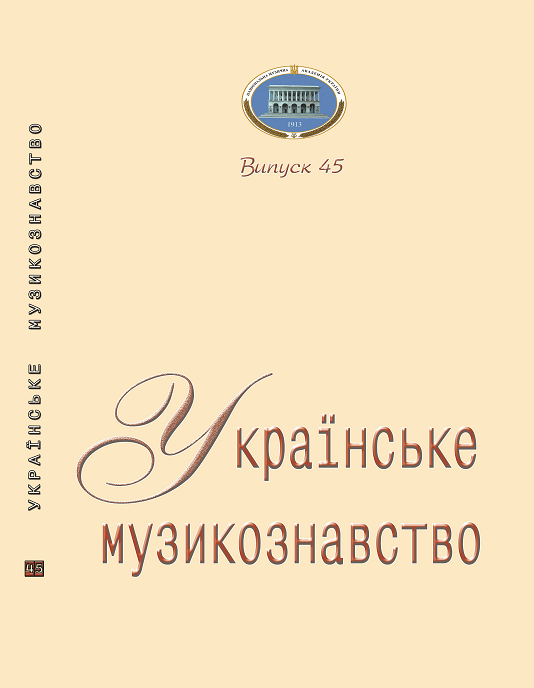BASIC METHODOLOGICAL FUNDAMENTALS OF MUSICOLOGY HISTORY (ABOUT IDENTITY OF SCIENTIF IC DIRECTION)
DOI:
https://doi.org/10.31318/0130-5298.2019.0.45.189937Keywords:
history of musicology, history of musicologists, dialogism, methodology of cognitive activit, Ukrainian tradition of music analysisAbstract
Setting problems. The high degree of development of many sciences and the demands of time lead induce generalized reflections on the conglomerate of the gained, history of its origin.
Much of the thinking in the field of musicology, like other fields, is gradually becoming the subject of particular attention of specialists. They are interested in the content of the gained, the history of works and their existence.
Relevance of the study. It is necessary to justify methodologically the science of musicology history as a separate special direction, to find out the place and significance of historical and musicological research in the problems of development of historical and musicological sciences, to develop the basics of the method of the corresponding two-unified analysis of the subject against the background of known works on the history of musical knowledge.
Analysis of recent researches and publications. In past studies researchers have covered the history of the development of music-theoretical systems in the full sense, demonstrated the personal explanation of separate music problems, or propous various synthetic analysis. The following examples of works by G. Riemann, L. Chevalier, Y. Khominskiy, I. Kotlyarevsky, groups of Moscow theorists – authors of a special monograph on this subject.
The purpose of this article is special methodological substantiation of science of History of musicology, development of fundamentals of the method of corresponding two-unified analysis of the subject. The subject of proposed work is the basis of the methodology of the history of musicology. Therefore the methodological fundamentals of the History of musicology there are the subject of proposed work.
Summary of the research. The fulfillment of these tasks is carried out by preliminary articulation of the essence of this theoretical science as a sphere of study of the sound composition of musical matter, the essence of its elements, the laws of connection between them, the related phenomena and their direct perception, and then by argumentation of identity history of musicology as a science, explanation of the subject and object of its study. The article explains the peculiarities of scientific specification history and musicology as an essential feature of the brunch.
Results and their significance. The importance of compensating historical and musicological knowledge for the researcher of the history of musicology is emphasized. The methodological scheme of historical-musicological researches is explained, which boils down to the construction of a one-line process, the content of which creates a number of musicological interpretations of its subject of attention within the relevant direction. The dialogism of the science of musicology history is covered: it is at the same time the history of musicologists and the history of musicology, representing the thinking tradition of Ukrainian intellectuals to promote-have-explore music. We look for its sources in worldviews that are revealed through the ontology of beauty, symbolization of creativity, respect for Wisdom, special natural musicality, which were first manifested in the initial analyzes of song folklore and church singing.
References
Viranovskyi, H. (1978). Musical-theoretical systems (subject and principle of incitement) [Muzychno-teoretychni systemy (Predmet i pryntsyp pobudovy)]. Kyiv : Muzychna Ukraina. 87 p. [In Ukrainian]
Hegel, G. B. F. (1993). Lectures on History of the Filosofy [Lekcii po istorii filosofii]. Saint Petersburg : Science. B. 1. 350 p. [in Russian]
Hnatyshyn, O. (2018). Historical measuring of the Ukrainian music-theoretical conceptions [Istorychnyi vymir ukrainskykh muzychno-teoretychnykh kontseptsii] Lviv: Vyd-vo Lvivskoi politekhniky. 600 p. [in Ukrainian]
Horskyi, V. (2006). Near the sources: Essays on the History of philosophical culture in Ukraine [Bilia dzherel: Narysy z istorii filosofskoi kultury Ukrainy]. Kyiv : Vyd. dim «Kyievo-Mohylianska akademiia», 2006. 258 p. [in Ukrainian]
Kotliyarevskyi J. Musical-theoretical systems of European studies: Methods of study and classification [Muzykalno-teoreticheskie sistemy evropeiskoho iskusstvoznaniia: Metody izucheniia i klassifikatsiia] // Kyiv, 1983. 158 с. [in Russian]
Kotliyarevskyi J. Introduction to the classification of musical theoretical systems [Vstup do klasyfikatsii muzychno-teoretychnykh system] // Kyiv, 1974. 47 s. [in Ukrainian]
Rыzhkyn Y. y Mazel L. Ocherky po ystoryy teoretycheskoho muzыkoznanyia. Moskva: Hosudarstvennoe muzыkalnoe yzdatelstvo, 1934. Vыp. I. 180 s.; Mazel L. A., Rыzhkyn Y. Ocherky po ystoryy teoretycheskoho muzыkoznanyia. Moscow; Lenynhrad: Hosudarstvennoe muzыkalnoe yzdatelstvo, 1939. Vыp. 2. 248 s. [in Russian]
Kholopov J., Kirillina L., Kyuregian T, Lyzhov G. Pospelova R., Tsenova V. Musical-theoretical systems: The Tutorial for Istoriko-theoretical and composer faculty of Music Universities [Muzykalno-teoreticheskiie sistemy: Uchebnik dlia istoriko-teoretycheskikh i kompozitorskikh fakultetov muzykalnykh vuzov] // Moskow, 2006. 631 p. [in Russian]
Khominskiy Y. The History of harmony and kontrapunkt [Istoriia harmonii ta kontrapunktu] // Kyiv, 1979. T. 2. 411 s. [in Ukrainian]
Chevalier L. The History of Scientist about the harmonica [Istoriia uchenij o harmonii]. Moskow, 1932. 183 p. [in Russian].
Rieman H. Geschichte der musiktheorie im IX.–XIX. Jahrhundert. Leipzig, M. Hesse, 1898. 529 s. [in German]




